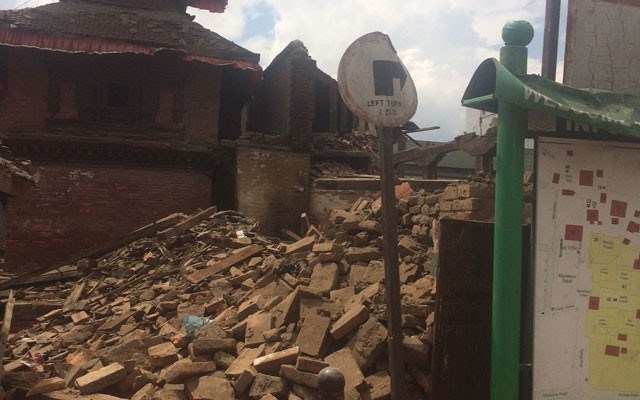Amidst all the devastation and suffering in the aftermath of the massive earthquake that struck Nepal two weeks ago, Whistler's Maureen Harriman was surprised to find moments of humanity shine through.
Harriman, who landed in Kathmandu with a group of ear, nose and throat doctors just minutes before the 7.8-magnitude earthquake hit, was consistently amazed at the spirit of perseverance of the Nepalese people.
"It was a real learning experience for me to see a whole population pull together in a devastating event like that. I was so surprised at how amazing the people from Nepal were," Harriman said. "A lot of people were displaced from their homes; people were sleeping in parks and garbage dumps either because they were afraid to go back to their homes or they had lost their homes. And you would think they were all sitting around waiting for a concert; it was calm, peaceful."
Another eye opener for Harriman, who returned to Whistler after spending over a week volunteering in Kathmandu and the central city of Pokhara, was seeing just how poorly equipped Nepal's healthcare infrastructure was to handle such a massive disaster.
"To have very basic healthcare and then have a disaster like this imposed upon it, it's very difficult for people to get through that. There's definitely a ton of need," she said. "You realize how lucky we are in Canada."
Last month's quake reinforces just how crucial it is to be prepared in the event of a disaster, something the municipality is reminding the community of during Emergency Preparedness Week, May 3 to 9.
"The biggest thing we can all do is be better prepared in our own homes to wait out 72 hours at a minimum," explained Jen Ford, council's appointee to the municipality's Emergency Planning Committee.
Municipal hall is emphasizing "personal responsibility" for disaster preparedness this week, said Mayor Nancy Wilhelm-Morden. That means knowing the risks associated with your neighbourhood; having a plan in the event you have to evacuate your house; and building a kit that can keep your family and pets hydrated, fed and warm for at least three days.
"When an emergency happens it may well be that our emergency personnel are overwhelmed, so they may not be able to assist individuals," Wilhelm-Morden said. "In addition to that, depending on the emergency, there may be interruptions in water service or hydro in particular so people have to be prepared to be on their own for at least 72 hours. You can make your emergency kit as basic or as complicated as you like, but certainly have one available."
In November, the municipality presented its updated Comprehensive Emergency Management Plan, which identified 32 unique hazards that could impact Whistler, ranking them according to risk. At the top of the list were five hazards: earthquake, interface fire, interruption to water supply, minor snowstorm and a volcanic eruption.
As part of the presentation, a mobile app was unveiled that is meant to walk emergency staff through any emergency, analyzing information, centralizing the response, and sending out notices to the appropriate personnel.
For more information on how you can be fully prepared for emergencies, visit www.whistler.ca or www.getprepared.ca.
Locally, Fun for Kids is donating clothing to children in Nepal. The store is also accepting any old clothes the community would like to donate at its village store.
Creekbread will be holding a fundraiser for Nepal on Thursday, May 7, with the funds raised going to the Umbrella Foundation. This is a charity that provides shelter, education, and a sense of family for the orphans of Kathmandu.




